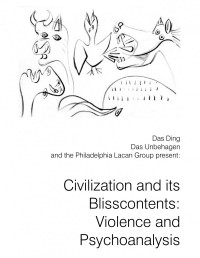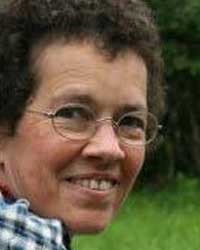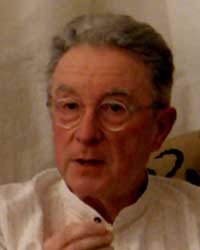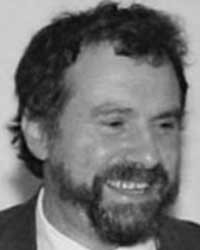Patricia Gherovici: Attack of the Difficult Ecrits – Class 2 – The Situation of Psychoanalysis
This class was based on a collaborative annotated reading by Patricia Gherovici and Manya Steinkoler of Lacan’s “The Situation of Psychoanalysis and the Training of Psychoanalysts in 1956,” to be published in the forthcoming Reading the Écrits – A Guide to Lacan’s Works, edited by Derek Hook, Calum Neill, and Stijn Vanheule. The following is an excerpt from this forthcoming volume, posted here with permission from the editors: Psychoanalytic Fable In the essay, fittingly vituperative, Lacan will now adopt an absurdist tone in what will take the form of an extended fable emulating moralist philosopher Jean de la Bruyere (1645-1696)’s satires inspired by Theophrastus (371-287 BC). Both authors are dear to Lacan, and the French comic tradition. Lacan describes the pitfalls of the bureau...Read More
Jamieson Webster: Attack of the Difficult Ecrits – Class I – Variations on the Standard Treatment
A poetic rendition by Cecilia Wu If we follow Jamieson’s lead and focus on the writing itself, considering the fact that Lacan’s writings are unsweetened, condensed transcripts of his speech acts, it’s hard to dismiss his mode of attack as a pain in the ass, or as unruly hunks of raw hide to be adorned with the transferential ornaments of infantile hate. Lacan himself counsels against merely reproducing the crossfire of attack and counterattack, serially recapitulating a civil war of transference that exiles the enemy while clinging to the hope that it will all come out in the wash. The clash of minor differences runs through an opinionator equalizer akin to the trifling ‘intermediary discourse’ Lacan wishes to silence, the chatter that enforces homeostasis as...Read More
On Violence: Civilization and its Blisscontents
On Violence: Civilization and its Blisscontents Violence today seems not to address only our physical bodies and sense of safety: Columbine, Sandy Hook, Virginia Tech, ISIS, but also our positions as subjects: the medicalized body, the surgically aesthetically improved body, civic subjectivity reduced to consumption, mental health reduced to pharmacology. Timothy McVeigh said, “the government is increasingly hostile,” and blowing up the Murrah Federal Building in Oklahoma City was what he called “the just response.” This conference asks questions about violence and its relationship to the Other. Freud famously showed how civilization brought discontent, a necessary consequence of repression. Today, with the command to enjoy as part of the social symbolic entreaty, perhaps we can say that ...Read More
Conference: Psychoanalysis on Ice
We invite psychoanalysts of all theoretical orientations to meet in Reykjavik and discuss foundational psychoanalytic concepts as well as the challenges of psychoanalysis today. The history of psychoanalysis has been fraught with divisions, separations, excommunications, and seemingly unbridgeable rifts. That historical divisions are often transmitted makes for a markedly chilly present. We hope to potentiate deeper engagement among psychoanalysts, revisiting and revivifying fundamental concepts, and to consider together the challenges that face us all, from the abstract to the practical. Psychoanalysis on Ice is not sponsored by, nor does it have an affiliation with, a particular school or group of psychoanalysts. We hope that by extending an open invitation, we can establish a comfortabl...Read More
Patricia Gherovici: TWO FUND(a)MENTAL CONCEPTS OF LACANIAN PSYCHOANALYSIS – THE PHALLUS AND OBJECT « a »
Four classes: May 22, 29, June 19, 26, 2014. Can psychoanalysis rethink sexuality without fully relying on the controversial and contested notion of the phallus? The simplest, schematic version of the Freudian Oedipal model offers a binary logic of having or not having it, of presence or absence: boys have it, girls don’t. For Freud, castration is a loss that women think they have suffered and that men fear. For Lacan, the phallus is clearly not the penis; for him castration is even a more fundamental loss affecting both sexes since both sexes are castrated. Nobody can have the phallus or can be it. In the mother’s body, nothing is missing. Lack is purely a logical limit—the mother is deprived of something she does not have. The phallus is the object that appears to veil a symbolic ...Read More
Ann-Louise Silver: Psychoanalysis and Psychosis
Ann-Louise S. Silver, MD is a graduate of Johns Hopkins University (B.A., M.D. and the State of Maryland-Johns Hopkins psychiatric residency program), and the adult program of the Washington Psychoanalytic Institute. She completed the family therapy training program of the Washington School of Psychiatry. She is a Clinical Adjunct Professor of Psychiatry at the Uniformed Services University of the Health Sciences, and teaches at the Military Residency Training Program at the Walter Reed Army Medical Center, the Washington Psychoanalytic Institute, and the Washington School of Psychiatry. She is a Distinguished Fellow of the American Psychiatric Association. She heads the Columbia Academy of Psychodynamics, and is in private practice in psychoanalysis and psychotherapy. She is the past and ...Read More
Jamieson Webster & David Lichtenstein: Jacques Lacan’s Return to Freud and Its Clinical Implications II
A common misconception concerning Jacques Lacan is that his work was inherently un-clinical— that he did not discuss clinical issues concerning technique or provide clinical cases—making him more of a philosopher or meta-theoretician. In this course, we hope to dispel this mischaracterization and begin with key clinical cases touched on by Lacan during his Seminars from 1952-1980, from Freud’s Little Hans and The Case of a Female Homosexual, to his discussion of cases by other psychoanalysts such as Ernst Kris, Ella Freeman Sharpe, and Joan Riviere. Through this reading of cases and Lacan’s often unknown and extensive commentary on them, we hope to touch on some key Lacanian concepts— the signifier, desire, castration, the Real, and feminine sexuality— in order to better grasp their place ...Read More
Guy Le Gaufey: CASE PRESENTATION AND ITS DISCONTENTS
Guy Le Gaufey was a member of the École Freudienne de Paris from 1974 to its dissolution in 1980. He co-founded the Lacanian revue Littoral in 1981, and the École lacanienne de psychanalyse in 1985. He has written many papers (available at www.legaufey.fr), and published many books at epel (www.epel-edition.com). He is also translator from English to French of some books, most of them dealing with Gender Studies.
Conference: Psychoanalysis and Laughter
Psychoanalysis and Laughter What does psychoanalysis have to tell us about laughter? In his Jokes and Their Relation to the Unconscious (1905), Freud famously illuminated the Witz’s linguistic and economic properties. Linguistically, the Witz “works” like the dream (by condensation and displacement); economically, it bypasses the “inhibiting factor” both in the teller of the joke and in the listener. Jokes are serious business for Freud: like dreams, they allow aggression an acceptable form, establishing a social tie while satisfying repressed wishes. Jokes are serious business for Lacan too. Of necessity, the analysand speaks “à coté du vrai” (beside truth) because speech ignores the real. In the symptom, however, the real manifests itself by not stopping, just like the persistent grin of...Read More
David Bell: INSTITUTIONAL AUTHORITARIANISM AND ITS DISCONTENTS
Dr David Bell is President of The Brisish Psychoanalytic Society. He is a Consultant Psychiatrist in the Adult Department at the Tavistock and Portman NHS Foundation Trust where is Director of Postgraduate Training and leads a specialist service (the Fitzjohn’s Unit) for the more complex cases. He lectures and publishes widely on various subjects including the historical development of psychoanalytic concepts (Freud, Klein and Bion) and the psychoanalytic understanding of severe disorder . For his entire professional career he has deeply involved himself in interdisciplinary studies (the relation between psychoanalysis and literature, philosophy and socio-political theory). He has written numerous papers and chapters in books/monographs, edited two books, Reason and Passion and Psychoa...Read More
Das Unbehagen Opening Letter
The original ‘Unbehagen’ that led us to call this meeting stemmed from our experience of training at The New York Psychoanalytic, and getting involved in the politics of the American Psychoanalytic Association, and the International Psychoanalytic Association. These experiences produced a schism between our will to progress through the training to become credentialed psychoanalysts and the pleasure of psychoanalysis, the latter diminishing in the face of the training experience. As our discontent increased, we began speaking to many people from institutes across the city and elsewhere, as well as colleagues in clinical psychology doctoral programs, social work programs, and those wishing to be, or training as, lay analysts, and there seemed to be a general discontent or ill-ease that we id...Read More

















